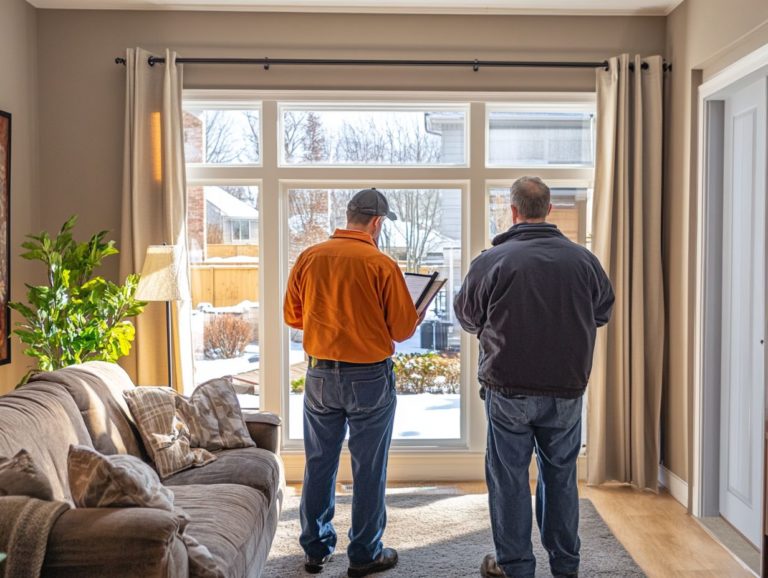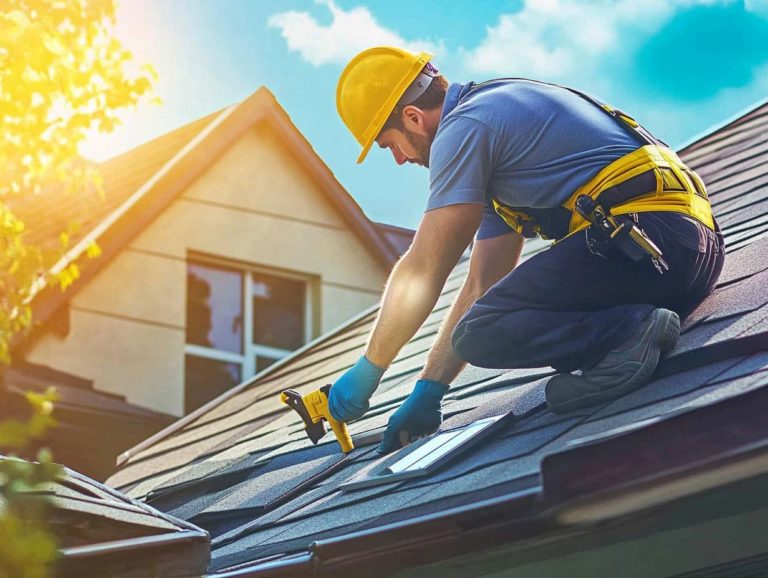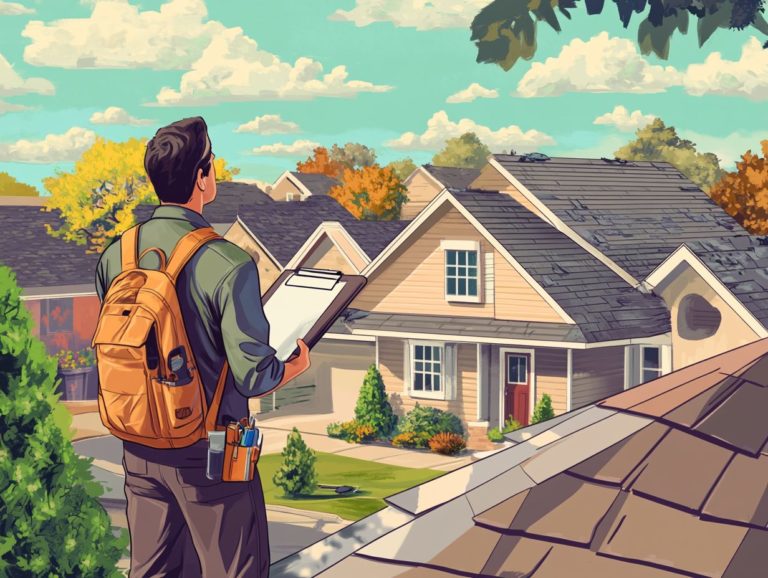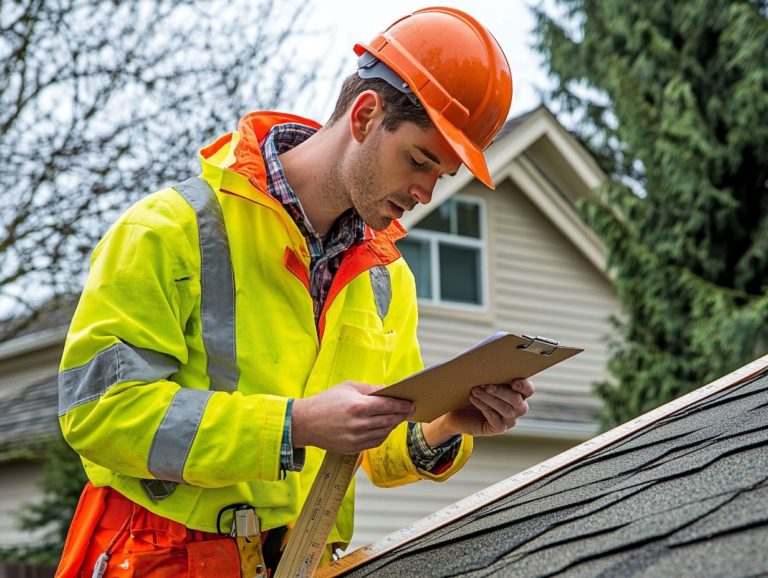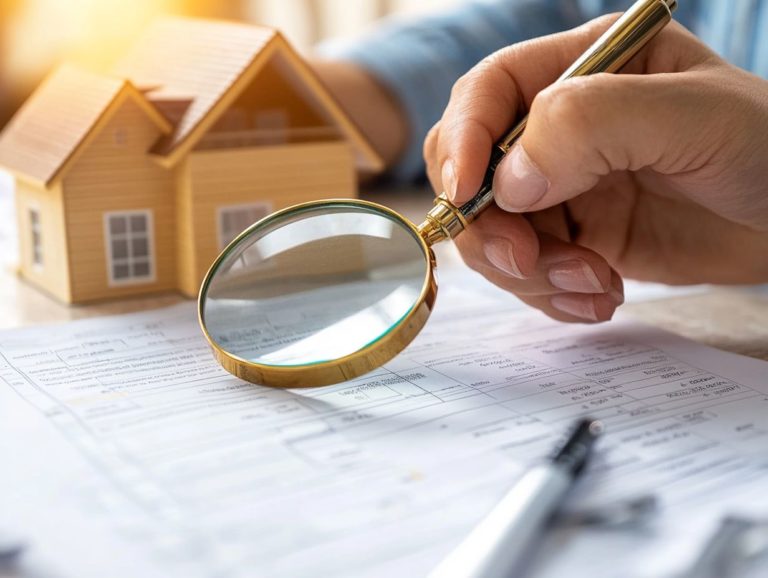How to Prepare for a Home Inspection: Best Practices
A home inspection can be a pivotal moment in your buying or selling journey, unveiling essential insights about a property’s condition.
Grasping its purpose and significance is crucial for you, whether you’re buying or selling. With the right preparation, you can navigate the inspection process with confidence.
This guide will lead you through effective preparation steps, spotlight common issues that may arise, and offer tips for a successful inspection. Whether you’re a first-time homebuyer or a seasoned seller, you re in the right place to ensure you re fully equipped for this important process.
Contents
- Key Takeaways:
- What is a Home Inspection?
- Why Prepare for a Home Inspection?
- Steps to Prepare for a Home Inspection
- Common Issues Found During Home Inspections
- Tips for a Successful Home Inspection
- Frequently Asked Questions
- What is a home inspection and why is it important?
- When should I start preparing for a home inspection?
- What should I do to prepare my home for an inspection?
- How can I make sure my home passes the inspection?
- Should I be present during the inspection?
- What happens if the inspection reveals major issues?
Key Takeaways:

- Ensure a smooth and successful home inspection by preparing beforehand.
- Understand the purpose and importance of a home inspection and the benefits of proper preparation.
- Follow the necessary steps to prepare, including addressing potential problem areas and seeking expert recommendations.
- Be proactive in identifying and addressing common issues found during inspections.
What is a Home Inspection?
A home inspection is a detailed check-up of a property’s condition, typically carried out by a qualified home inspector. This process provides you with a thorough inspection report detailing critical aspects such as structural integrity, electrical systems, plumbing, and heating, ventilation, and air conditioning (HVAC) systems.
Such evaluations play an essential role in the real estate landscape, particularly in Texas and beyond, ensuring you make informed decisions regarding your investment.
Purpose and Importance
The purpose of a home inspection is to deliver a thorough assessment of the property s condition. This ensures transparency and enhances your confidence as a buyer.
The detailed inspection report you receive can significantly influence your negotiation strategies. It identifies major issues that could impact the property s safety or value.
A thorough inspection is crucial for ensuring a fair residential service contract by uncovering necessary repairs that could lead to costly surprises if overlooked.
By promoting open communication between you and the seller, the inspection process fosters trust. This enables informed decisions and smoother transactions.
Ultimately, understanding the condition of a home not only protects your investment but also establishes a professional relationship rooted in honesty and reliability.
Why Prepare for a Home Inspection?
Don’t wait until the last minute! Preparing for a home inspection allows your property to showcase its finest attributes and sets you up for great results. To learn more about what to anticipate, check out understanding the home inspection process.
By taking these steps, you minimize the chances of encountering major issues on inspection day, which can be crucial for a smooth process. Refer to the essential checklist for home inspections to enhance the entire home selling experience.
Benefits of Proper Preparation
Proper preparation for a home inspection can elevate your property’s value and make it more appealing to potential buyers. For tips on how to prepare for a home inspection, ensuring that all inspection access points are clear and easy to navigate is also essential.
A well-prepared home boosts buyer confidence, allowing them to envision their future in the space while minimizing surprises throughout the process.
Embrace simple cleaning tips like decluttering rooms and ensuring that major appliances shine to create a lasting positive impression. Organizing paperwork related to maintenance and renovations can further reassure potential buyers about the property s condition.
Steps to Prepare for a Home Inspection

To prepare effectively, follow essential steps that include meticulous home maintenance, addressing any visible concerns, and employing best practices for home inspections to ensure that nothing goes unnoticed.
Start preparing your home today to make the inspection process smooth and successful!
Before the Inspection
Don t wait to tackle those necessary home repairs. Attend to exterior maintenance and implement effective cleaning strategies to create an inviting atmosphere for potential buyers.
By addressing minor repairs like fixing leaky faucets or replacing broken tiles you can significantly boost how appealing your property looks. A well-maintained yard, complete with a freshly mowed lawn, trimmed hedges, and cleared debris, will further enhance that all-important first impression.
Take action now to deep clean every corner, from sparkling windows to spotless baseboards. This not only elevates the aesthetic but also shows how well you ve cared for your home. These proactive measures can profoundly impact a buyer s perception, instilling confidence that your home is a worthy investment.
During the Inspection
During the inspection, you ll see the professional home inspector meticulously conduct a visual examination of various elements around your home. They ll document their findings and assess all access points to ensure a thorough evaluation of the property.
This process involves scrutinizing essential systems like plumbing, electrical components, and how strong and stable the home is while also looking for any signs of wear or potential hazards.
As a homeowner, your role is pivotal at this stage; providing easy access to these areas is crucial. This might mean unlocking doors to attics, basements, and crawl spaces.
Clear communication builds trust! Both buyers and sellers benefit from having a clear understanding of any issues that arise during the inspection. By facilitating this process, you can help ensure that any necessary repairs are addressed promptly, fostering trust among all parties involved.
After the Inspection
After the inspection, you ll receive a comprehensive report that outlines all findings, which you can then use as a foundation for your negotiating strategy, accurately reflecting the property’s condition.
This report is invaluable for both buyers and sellers, spotlighting existing issues and potential repairs that could sway their positions in negotiations.
As a buyer, understanding the documented discrepancies will enable you to make informed offers or requests for repairs, ultimately leading to more equitable negotiations. Conversely, if you re a seller, this is your opportunity to proactively address any concerns or adjust your pricing based on the report, paving the way for smoother transactions.
In the end, the inspection report serves as a crucial reference point, guiding your decision-making and strategic planning throughout the real estate process.
Common Issues Found During Home Inspections
Home inspections frequently uncover a range of issues, from minor repairs to more significant concerns. These can include:
- Foundation problems: Can lead to serious structural issues.
- Deficiencies in electrical work: May pose fire hazards.
- Plumbing and sewage complications: Can result in costly damages.
- Pest control requirements: Infestations can damage the property.
Each of these factors can profoundly influence the property’s appeal and overall value, making it essential for you to be aware of them.
Identifying and Addressing Problem Areas
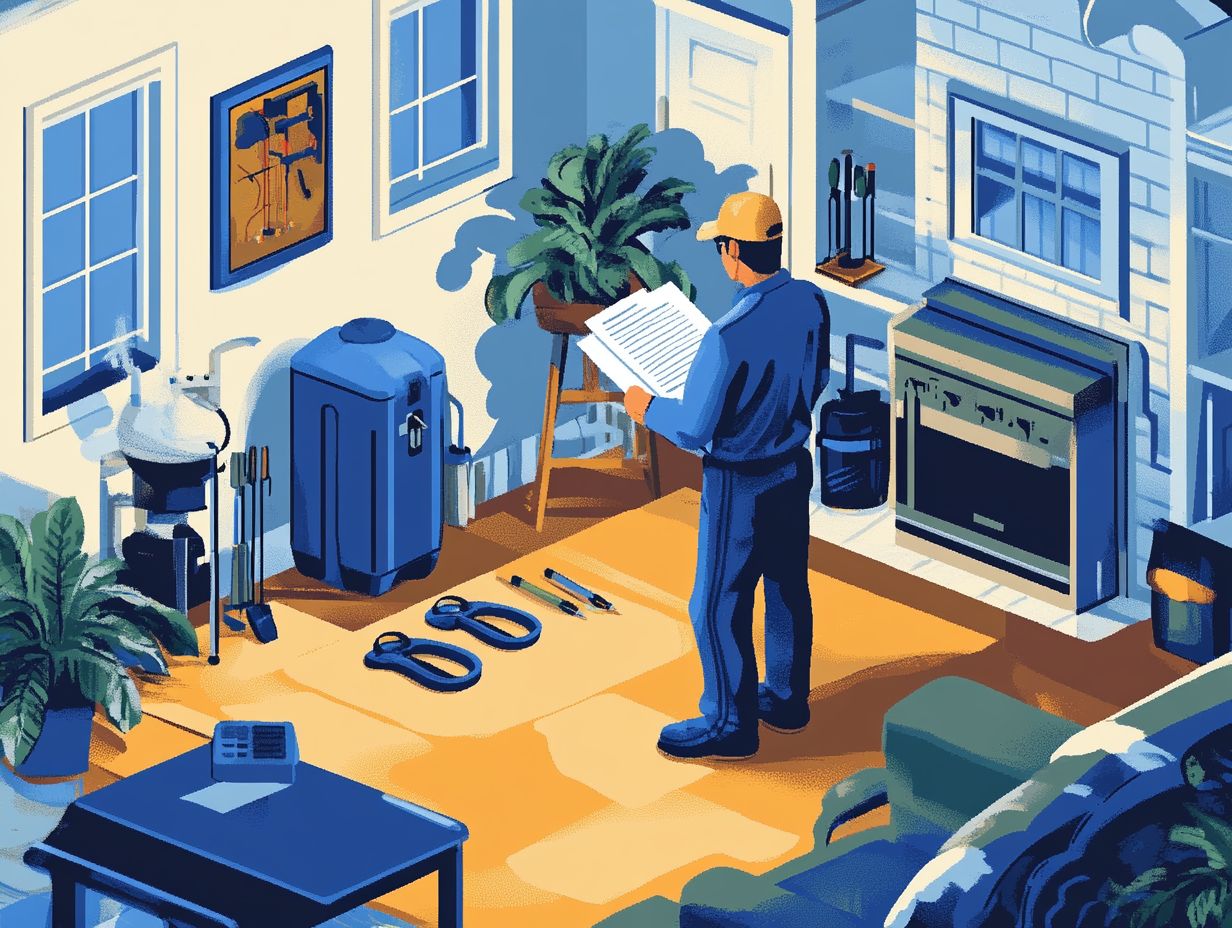
Identifying and addressing problem areas during home inspections is essential not just for ensuring your property meets safety standards but also for preventing major issues that could derail a sale. Resolving inspection findings promptly can save you a great deal of hassle down the line.
Take action now to familiarize yourself with common trouble spots like the roof, plumbing, and electrical systems. A thorough visual inspection can unveil signs of wear, moisture damage, or outdated wiring.
Using checklists can help you systematically assess each area, ensuring that nothing slips through the cracks.
Engaging qualified professionals for a second opinion on significant concerns can provide you with peace of mind and valuable context. By tackling these issues now, you can avoid potentially costly repairs later, making your property not only more reliable but also more appealing to future buyers.
Tips for a Successful Home Inspection
To achieve a successful home inspection, you should adhere to expert recommendations, including tips for a successful home inspection day, that emphasize the importance of home maintenance.
Utilizing a comprehensive inspection checklist and applying effective cleaning tips will not only enhance the appeal of your home but also leave a lasting impression on potential buyers.
Expert Recommendations
Expert recommendations for homeowners preparing for a home inspection emphasize the importance of showcasing a pristine home through diligent maintenance. Following key steps to prepare for a home inspection and a careful review of the inspection checklist is crucial.
Beyond just keeping things tidy, it’s essential to tackle any visible issues. This means:
- Repairing leaky faucets
- Checking for proper insulation in the attic
- Ensuring smoke detectors are functional
Elevating your home’s curb appeal by trimming overgrown shrubs, giving your front door a fresh coat of paint, and cleaning out the gutters can create a remarkable difference.
Decluttering and organizing your spaces is also crucial, as it fosters an inviting atmosphere. These proactive steps significantly increase your chances of a successful inspection while demonstrating your commitment to maintaining and valuing your property.
Frequently Asked Questions
What is a home inspection and why is it important?
A home inspection is a thorough examination of a property’s condition, typically conducted before a home is sold. It is essential because it reveals hidden problems that could affect safety or reduce your home s value.
When should I start preparing for a home inspection?
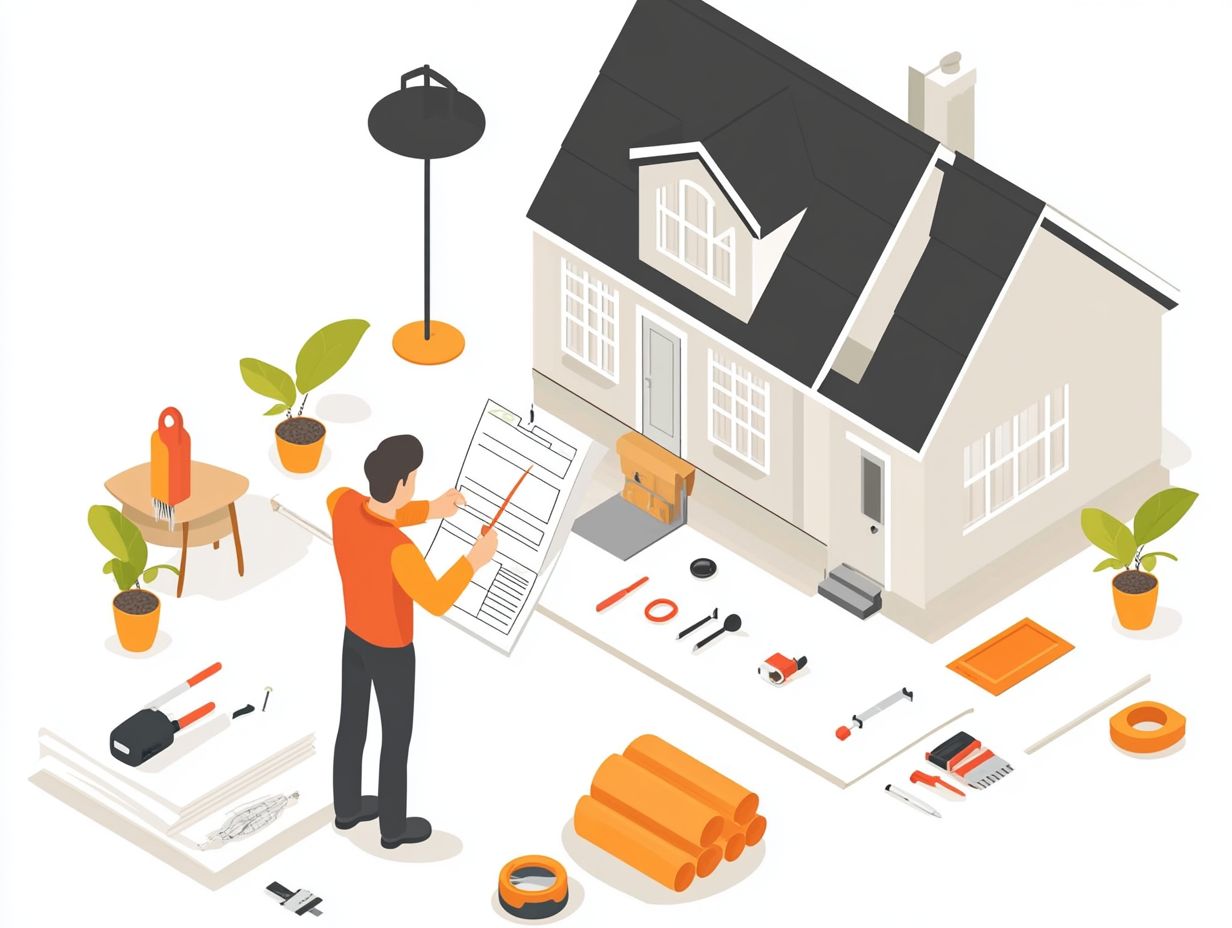
Start preparing for a home inspection as soon as you put your home on the market. This will give you ample time to address any potential issues and make necessary repairs before the inspection takes place. For detailed guidance, check out this article on how to prepare for a successful home inspection.
What should I do to prepare my home for an inspection?
Ensure your home is clean and clutter-free. Check that all major systems, such as heating and cooling, plumbing, and electrical, are in good working condition. Additionally, it’s advisable to follow essential steps to prepare for a home inspection by gathering relevant paperwork, including maintenance records, for the inspector to review.
How can I make sure my home passes the inspection?
While there is no guarantee that a home will pass an inspection, you can enhance your chances by addressing known issues and making necessary repairs beforehand. To understand more about the process, refer to what to expect during a home inspection. Being honest with the inspector and providing all necessary information is also crucial.
Should I be present during the inspection?
Although it is not required, it is recommended to be present during the inspection. This allows you to ask questions and better understand any potential issues the inspector may find. It also gives you the opportunity to address any concerns the inspector might have.
What happens if the inspection reveals major issues?
If the inspection uncovers major issues, you have several options. You can negotiate with the buyer to repair the issues, offer a credit towards the cost of repairs, or consider walking away from the sale. Discussing these options with your real estate agent is important to reach an agreement with the buyer.
Don’t wait! Start your preparation today!

